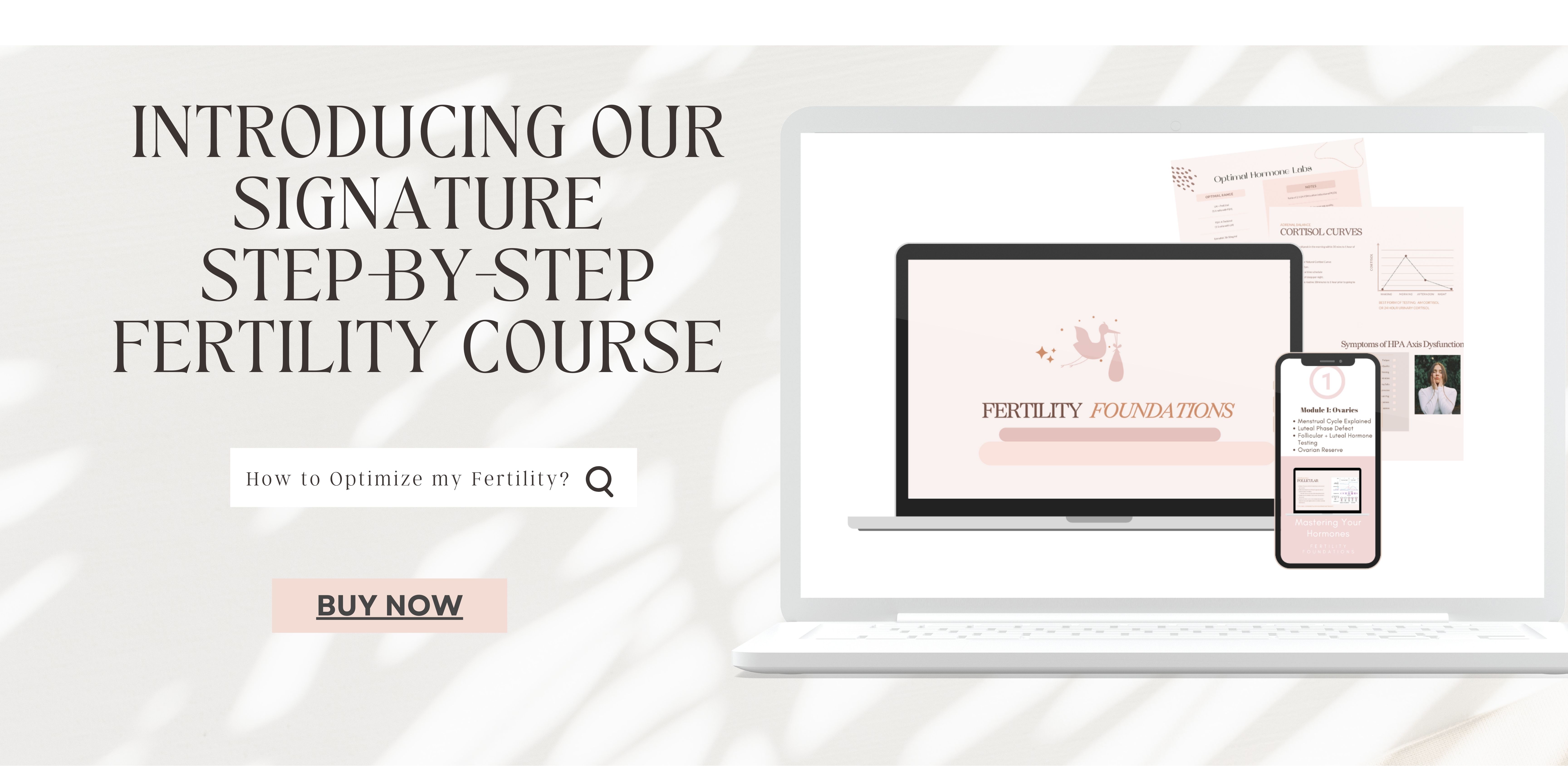
Does CoQ10 Help Egg Quality?
Oxidative stress is one of the major known causes of infertility. But, what is oxidative stress really and how can we reverse it? Oxidative stress occurs when there is an imbalance between free radicals and antioxidants in our body. And although some free radicals are generated internally within our body, we also can accumulate free radicals from external sources like environmental pollution, toxic metals, cigarette smoke and pesticides, to name a few. Free radicals are oxygen-containing molecules with an uneven number of electrons. The uneven number allows them to easily react with other molecules creating reactive oxygen species (ROS). Unfortunately, excessive production of reactive oxygen species(ROS) has been linked to a variety of reproductive diseases including PCOS, Endometriosis and unexplained infertility.
Although testing for oxidative stress is not commonly ordered by your conventional doctor, this is something we found extremely useful especially when treating women with unexplained infertility. At NMD Wellness of Scottsdale, we use comprehensive testing to estimate free radical damage including lipid peroxidases (oxidative damage to cell membranes) and 8-hydroxy-deoxyGuanosine (oxidative damage to DNA) in order to evaluate the patient’s oxidative stress status and antioxidant reserve. Addressing oxidative stress in women preparing to undergo assisted reproductive technology (ART) procedures like IVF, has also helped our patients improve their chances of a successful pregnancy.
Since oxidative stress can impact your ability to get pregnant. Many women with unexplained infertility considering the use of ART procedures like IVF, should be evaluated for oxidative stress.. Unfortunately not only is IVF expensive but if we don’t address oxidative stress, could IVF even work?
Recently researchers have been particularly interested in the use of Coenzyme Q10 (CoQ10) in reducing oxidative stress and improving clinical pregnancy rates, especially in women with unexplained infertility undergoing ART procedures. So what does the research say and could CoQ10 be helpful for you?
Coenzyme Q10 is an important antioxidant and nutrient that occurs both naturally in the body and is also found in many foods including organ meats, fatty wild caught fish, vegetables (spinach, cauliflower and broccoli), as well as nuts and seeds. Coenzyme Q10 is a substance that is needed for basic functioning of cells. It is a source of fuel for the mitochondria – the “power plants” that convert energy for the cell to use. CoQ10 plays an important role in metabolism as well as it helps protect our cells from ROS damage. CoQ10 also plays an essential role in cardiac function and has been found to improve endothelial dysfunction which researchers believe may enhance cardiac ATP (energy) production.
Researchers have been specifically interested in the use of oral CoQ10 supplementation on the rate of clinical pregnancy (CPR), live birth rate (LBR) as well as miscarriage rates (MR) in women with infertility undergoing ART. And boy were researchers surprised, of the five randomized-controlled trials they reviewed which included 448 infertile women; 215 in the CoQ10 group and 234 in placebo/no treatment group), they found that oral supplementation of CoQ10 resulted in an increase in clinical pregnancy rates compared with the placebo/no treatment group. Researchers even found this phenomenon to be true when women with poor ovarian response and polycystic ovarian syndrome were analyzed separately.
The reason CoQ10 is of interest in women with poor ovarian response is because it is speculated that as egg quality declines, so does their mitochondrial energy production. It is theorized that perhaps eggs could function more effectively and efficiently if something, like CoQ10, could be done to increase the number or function of healthy mitochondria in eggs. This increase in energy reserve is thought to help the egg potentially do a better job of maintaining chromosomal normalcy, improving the chance of pregnancy. This theory comes from researchers that noticed that eggs in older females (both in mouse and human model) seem to have a diminished expression of the enzymes responsible for CoQ10 production (Pdss2 and Coq6). Although still limited research, it is an interesting thought to consider for further studies.
Now, before you add CoQ10 to your cart
It is important to understand that although CoQ10 is over-the-count and widely available, it is always important to consult with your doctor before starting any new supplements, especially if you are planning for or currently undergoing an IVF cycle. It has been estimated that the average daily intake of CoQ10 from our diet is 3 to 6 mg per day. Since the majority of our dietary CoQ10 comes from meat consumption, evaluating CoQ10 levels would be especially beneficial for the plant-based and vegans out there. Again, this is where micronutrient testing can be helpful in order to assess your antioxidant status, including curing CoQ10 status.
Unfortunately, research is limited on the exact dosing for CoQ10 supplementation and varies greatly. The suggested dose can be anywhere from 50 to 600 mg daily, undivided doses. Most often CoQ10 is given at a dosage between 100mg -300mg per day. There is however some evidence from studies that doses of up to 1200mg per day are safe.
Although we have found CoQ10 supplementation helpful especially in women over 35 years old undergoing IVF, there are other important ways we can all can start reducing oxidative stress today.
Best Ways to Reduce Oxidative Stress
Exercise
If there is one thing I will say until I am blue in the face, it has to be exercise! Now more than ever our sedentary lifestyles are hindering our health in more ways than one. Practicing regular daily moderate physical activity (15-20mintues 6 days a week) has been associated with a lower resting metabolic rate, higher antioxidant activity and lower oxidation of LDLs and more protection against oxidation of proteins and DNA. So if you aren’t currently exercising regularly, before adding CoQ10 to your cart, I would suggest making exercise a priority. Exercise has also been shown to improve insulin sensitivity and reductions of oxidative stress and inflammation often associated with unexplained infertility and other reproductive diseases like PCOS and Endometriosis.
Fasting?
Although fasting has been shown to help reduce oxidative stress, it would not be something I would suggest for women trying to conceive. Although fasting, especially intermittent fasting, has some great health benefits, intermittent fasting may interfere with hormone production and can cause anovulatory (lack of ovulation) cycles in certain women.
Using Food As Medicine
To no surprise, researchers have found that avoiding calorie-dense refined sugars, saturated fats and processed foods can interfere with our body’s ability to eliminate ROS. Replacing these “foods” with nutrient dense organic vegetables, fruits and legumes will result in a significant increase in health-enhancing phytonutrients, including key vitamins and minerals, antioxidants, flavonoids, and other still undiscovered compounds important for our cells to work properly. Focusing on avoiding processed foods, even the “healthy” ones and sticking to a farm-to-table diet is a great way to reduce oxidative stress.
Sleep
If you aren't making sleep a priority, it’s time you do so. Researchers have found that the amount of energy we produce and create in response to our body’s circadian rhythm appears to play a significant role in controlling oxidative stress. High quality sleep in a dark room helps your body produce necessary amounts of the endogenous powerful antioxidant melatonin which can combat oxidative stress.
Stress Management
Although we would all like to eliminate all stress in our lives, we know it’s not possible. We can however work on implementing stress management techniques on a regular basis to help us combat the health effects stress can have on our body. Researchers have found that psychological stress, commonly caused by our modern world, can predispose us to disease, reduce the effectiveness of our immune system and possibly also reduce the effectiveness of our antioxidants and repair pathways. Some important stress management tools you can start implementing today include:
-
Deep breathing exercises.
-
Meditation.
-
Mindfulness meditation.
-
Mental imagery relaxation.
-
Biofeedback
-
Counseling, to help you recognize and release stress.
About the Author: Meet Dr. Zen Alissia Zenhausern- Pfeiffer, NMD, FABNE, (commonly known by her patients as Dr. Zen), is a licensed naturopathic doctor board certified in naturopathic endocrinology and the founder of NMD Wellness of Scottsdale, a premier naturopathic medical practice that focuses on helping women to take a proactive approach to their hormone and fertility health. Dr. Zen has been featured as a lead expert in Forbes, Shape Magazine, and Instyle and is deeply passionate about bridging the gap between traditional and natural medicine in the world of fertility. She works with a variety of hormone related issues including PCOS, endometriosis and unexplained infertility. Her goal is to help more women get back into the driver’s seat of their own health to make lasting transformational changes to their health to bring more cute and adorable babies into this world. Read More About Dr. Zen...
Alissia Zenhausern- Pfeiffer, NMD, FABNE, (commonly known by her patients as Dr. Zen), is a licensed naturopathic doctor board certified in naturopathic endocrinology and the founder of NMD Wellness of Scottsdale, a premier naturopathic medical practice that focuses on helping women to take a proactive approach to their hormone and fertility health. Dr. Zen has been featured as a lead expert in Forbes, Shape Magazine, and Instyle and is deeply passionate about bridging the gap between traditional and natural medicine in the world of fertility. She works with a variety of hormone related issues including PCOS, endometriosis and unexplained infertility. Her goal is to help more women get back into the driver’s seat of their own health to make lasting transformational changes to their health to bring more cute and adorable babies into this world. Read More About Dr. Zen...


